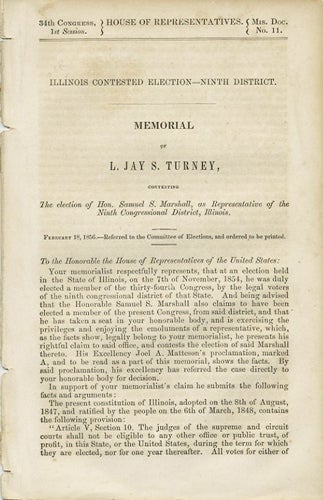Illinois contested election - ninth district. Memorial of L. Jay S. Turney, contesting the election of Hon. Samuel S. Marshall, as representative of the ninth Congressional district, Illinois. February 18, 1856. Referred to the Committee on Elections, and ordered to be printed. 34th Congress, 1st session. House of Representatives. Mis. doc. no. 11.
[Washington, D.C.]: n.p., 1856. 8 pp. 8vo. Removed. First edition. Item #37661
An important case about states' rights. Turney, who came in second in an election to Congress, argues that the states set the rules for who can run for office and that the state constitution of Illinois prohibited former judges from running for office for a period of one year after their term expired and that Marshall should have been disqualified from being seated by the Congress because he had been a judge in the 12th district and ran for office during the exclusion period. Turney states: "The constitution of the United States provides that "each house shall be the judge of the election, returns, and qualifications of its own members." In so judging, and before you can rightfully decide, your honorable body must regard the constitutions and laws of the States sending contestants; for members of Congress are elected under and in persuance of State constitutions' and laws! And there is no provision in the constitution of the United States, and no law of Congress, prohibiting the people of each State from declaring, by constitutional provision, who shall, and who shall not be legal voters! The right of suffrage is exclusively under the control of the lawmaking power of the different States; and the people of Illinois did not transcend their power in providing that all votes cast for a certain class of citizens, within her limits, should be void....If either house of Congress has the right to disregard a plain, wholesome, and necessary provision of the constitution of a sovereign State, regulating and defining the elective franchise within that sovereignty, then, indeed, the States are but creatures of the general government, and the federal government, instead of being a government of delegated, defined, and limited powers, becomes a great central political monster, uncontroled and uncontrolable by the weaker reserved powers of the States." The House wisely turned down Turney's request and seated Marshall. The appendix includes "An act to establish the twelfth district court."
Leander Jay Sharpe Turney (1819-1881) was later the acting Governor of the Washington Territory for 1861-1862.
OCLC locates only a copy, at Harvard Law (OCLC: 78246617).
Price: $200.00

